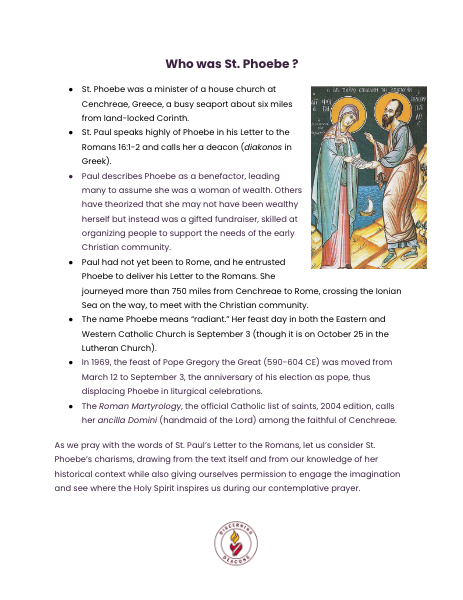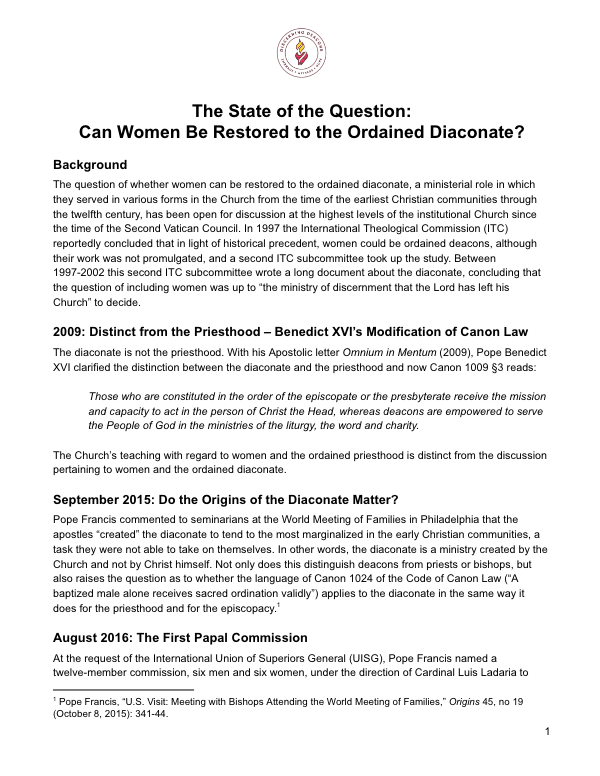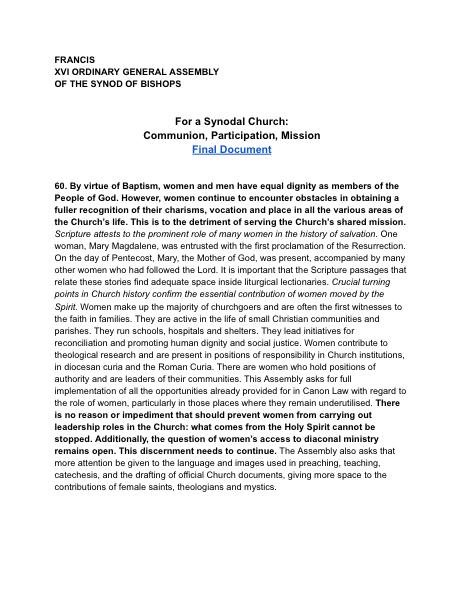Aprender
"Esta Tradición, que deriva de los Apóstoles, progresa en la Iglesia con la asistencia del Espíritu Santo: puesto que va creciendo en la comprensión de las cosas y de las palabras transmitidas, ya por la contemplación y el estudio de los creyentes, que las meditan en su corazón y, ya por la percepción íntima que experimentan de las cosas espirituales."
- Concilio Vaticano II Dei verbum, 8.
La Dra. Phyllis Zagano examina el debate sobre el restablecimiento de las mujeres en el diaconado ordenado, especialmente teniendo en cuenta el énfasis del Sínodo en la igualdad bautismal de mujeres y hombres. Revisa la investigación que apoya su reincorporación y presenta las conclusiones del Sínodo, que revelan desacuerdo entre los miembros sobre la historia y las posibilidades futuras de las mujeres diáconas ordenadas.
La teóloga australiana Margaret Mowczko escribió este capítulo para el libro Deacons and Diakonia in Early Christianity: The First Two Centuries publicado por Mohr Siebeck (enero de 2019). Usa investigación bíblica e histórica para analizar el significado de la afirmación de San Pablo sobre Febe como "nuestra hermana" y "benefactora de muchos," y su uso de la palabra griega Διάκονος (diácono) para describir el ministerio de Febe en Cencrea.
Comité Ad Hoc de la Canon Law Society of America, Canonical Implications of Ordaining Women to the Permanent Diaconate. Washington, DC: Canon Law Society of America, 1995. (Versiones electrónicas y/o en PDF de The Canonical Implication of Ordaining Women to the Permanent Diaconate ©1995, Canon Law Society of America. Todos los derechos reservados. Usado con permiso.)
¿Quién fue Santa Febe? ¿Y era realmente diácona?
Befriending Phoebe, a Co-Worker in the Kingdom –Hna. Colleen Gibson escribe para el Global Sisters Report, invitando a los lectores a hacerse amigos de esta santa que de otra manera sería menos conocida, una colaboradora de San Pablo, cuya memoria siempre ha inspirado a la Iglesia en la cuestión de la aptitud de las mujeres para encarnar la diakonia.
El P. Felix Just, SJ, quien enseña en los programas de Formación del Diaconado de varias diócesis estadounidenses y mantiene un extenso sitio web aclamado internacionalmente de "Recursos Católicos", aborda la pregunta directamente—"¿Es Santa Febe una santa?"—en un artículo originalmente publicado en LaCroix International y disponible en su sitio web.
DD en las Noticias
All Things Considered (NPR, 10 de junio de 2025)
Casey Stanton en el podcast "Preach" (America Media, 21 de abril de 2025)
Por Ellie Hidalgo (US Catholic, 25 de marzo de 2025)
Por Anna Robertson (National Catholic Reporter, 2 de octubre de 2024)
Por Rhina Guidos (National Catholic Reporter, 4 de octubre de 2024)
Por Christopher White (National Catholic Reporter, 30 de septiembre de 2024)
Por Ellie Hidalgo (El Ignaciano, septiembre de 2024)
Por Katie Mulcahy (America Magazine, 28 de abril de 2023)
Por Casey Stanton (America Media, 6 de junio de 2023)
Por Ellie Hidalgo (National Catholic Reporter, 21 de julio de 2023)
Recursos
Read & Study
A bishop's case for women deacons
Por Emil Wcela (America Media, 1 de octubre de 2012)
Cuestiones sobre el diaconado de las mujeres
Por Phyllis Zagano (Iglesia Viva, abril-junio 2018)
The conversation at the Amazon Synod
Por Luke Hansen (America Media, 7 de noviembre de 2019)
Un testimonio de una mujer diaconal
Por Hna. Círia Mees (Discerning Deacons, 21 de abril de 2021)
The distinction between deacons and priests
Por Phyllis Zagano (National Catholic Reporter, 24 de enero de 2019)
Callings Unanswered
Por Anna Keating (Notre Dame Magazine, Verano de 2022)
What U.S. Catholics think of women as deacons
Por Erick Berrelleza y Phyllis Zagano (Review of Religious Research, 3 de noviembre de 2018)
El Papa: los ministerios del Lector y del Acólito estén abiertos a las mujeres
Vatican News, 11 enero 2021
Called But Not Heard: The Movement for Women Deacons at the Synod
Por Anna Keating (Commonweal, 6 de octubre de 2024)
Women in the lectionary, the diaconate, and leadership
Por Mary Katherine Tillman (Notre Dame Magazine, Verano de 2018)
A call of their own: The role of deacons in the church
Entrevista con el Díacono William P. Ditewig (US Catholic, 6 de junio de 2014)
Preguntas Frecuentes
Todas las declaraciones papales y curiales en contra de la ordenación de mujeres se refieren específicamente al "sacerdocio ministerial" y a la "ordenación sacerdotal," no al diaconado. En 2002, la Comisión Teológica Internacional declaró sobre las mujeres diáconas: "Corresponde al ministerio de discernimiento que el Señor ha establecido en su Iglesia pronunciarse con autoridad sobre esta cuestión." Aunque el Papa Francisco ha confirmado que la reserva del sacerdocio para los varones "no es una cuestión abierta a discusión," ha establecido dos comisiones papales para estudiar la cuestión de las mujeres y el diaconado.
El Papa Juan Pablo II enseñó que la Iglesia "no tiene en modo alguno la facultad de conferir la ordenación sacerdotal a las mujeres," y sus sucesores han confirmado esta enseñanza. La ordenación de mujeres como diáconas no hace nada para cambiar esta doctrina. El diaconado es un orden "propio y permanente" que es distinto del sacerdocio. El Catecismo de la Iglesia Católica hace esta distinción: "De Él los obispos y los presbíteros reciben la misión y la facultad (el 'poder sagrado') de actuar in persona Christi Capitis, los diáconos las fuerzas para servir al pueblo de Dios en la 'diaconía' de la liturgia, de la palabra y de la caridad, en comunión con el obispo y su presbiterio" (n.° 875). En 2009, el Papa Benedicto XVI revisó la ley de la Iglesia para aclarar la distinción entre diáconos, presbíteros y obispos.
El fortalecimiento del ministerio laical es un legado perdurable del Concilio Vaticano II y un tremendo don para la Iglesia. Este compromiso debe mantenerse firme. Al mismo tiempo, la Iglesia mantiene ministerios ordenados que siempre necesitan renovación y "desclericalización." La restauración de las mujeres al diaconado, un ministerio profético de servicio en la Iglesia, fortalecería este proceso. La presencia de mujeres en el ministerio ordenado significa que serían clérigas, no necesariamente clericalistas. La lucha contra el clericalismo es una lucha para hombres y mujeres por igual, no solo para las mujeres.
Es cierto que la gran mayoría de los diáconos permanentes viven y ejercen su ministerio en el Norte Global, por lo que este ministerio es más familiar para los católicos en Estados Unidos y Europa que en otras partes del mundo. Sin embargo, en el reciente Sínodo de Obispos sobre la Región Panamazónica, los líderes de la Iglesia en la Amazonía —tanto obispos como líderes laicos— dejaron muy claro que las mujeres en la Amazonía ya están haciendo el trabajo de los diáconos, y es el deseo y la esperanza de esa iglesia ordenar a estas mujeres como diáconas. Además, el párrafo n.° 64 de Ensancha el espacio de tu tienda indica que "casi todas las síntesis plantean la cuestión de la participación plena e igualitaria de las mujeres" y piden que toda la Iglesia discierna sobre las mujeres y el diaconado.
El diaconado es un ministerio antiguo de liturgia, Palabra y caridad, modelado sobre el servicio de Cristo, que encarna la Iglesia Servidora y ayuda a la Iglesia a cumplir su misión de proclamar el Evangelio y bautizar a todas las naciones. Si el diaconado sirve necesidades pastorales importantes en la Iglesia hoy, entonces debería estar abierto a hombres y mujeres. En muchos lugares hoy que enfrentan graves escaseces de sacerdotes, los diáconos asisten en los ministerios sacramentales del bautismo y el matrimonio, presiden funerales y dan homilías. Las diáconas también podrían ejercer el ministerio en lugares donde es difícil que los hombres sirvan, como los hogares y habitaciones de hospital de mujeres, refugios para víctimas de violencia doméstica y en prisiones de mujeres.
Los obispos locales podrían formar, ordenar y otorgar facultades a estas mujeres, expandiendo la presencia de ministros ordenados en muchas esferas de la vida, y conectando a estas mujeres con parroquias, párrocos y obispos locales. Estas mujeres podrían recibir la gracia del Sacramento del Orden Sagrado como diáconas, ejercer jurisdicción eclesiástica, servir en oficios actualmente restringidos a clérigos, y ser reconocidas oficialmente por la Iglesia en un compromiso de por vida con su ministerio. Particularmente en comunidades rurales y marginadas, existe la necesidad de más obreros en la viña. Las diáconas podrían predicar en Liturgias de la Palabra con Comunión, celebrar bautismos, ser testigos de bodas, oficiar servicios funerales y acompañar a quienes más necesitan una presencia pastoral.
Las Constituciones Apostólicas (circa 380) enfatizan que las diáconas no ejercen los mismos roles litúrgicos que los presbíteros y obispos, pero son ordenadas por el obispo con la imposición de manos. El Concilio de Calcedonia (451) reconoció la ordenación de las diáconas y requirió que tuvieran 40 años y fueran célibes. Las diáconas fueron ordenadas por obispos en el santuario con una epíclesis y la imposición de manos (por ejemplo, un rito de ordenación bizantino del siglo VIII).
Según el Documento Final del Sínodo, "El proceso sinodal no concluye con el final de la actual Asamblea del Sínodo de los Obispos, sino que incluye la fase de implementación" (n.° 9), que culminará con una Asamblea Eclesial en 2028. Esta asamblea tendrá el objetivo de recoger "los frutos que han madurado" del proceso sinodal para guiar la renovación de la Iglesia. En resumen, si bien el Sínodo 2021-2024 como evento específico ha terminado, la sinodalidad como forma de ser Iglesia apenas está comenzando.
Según Ecclesiae de mysterio, dentro del contexto de una liturgia eucarística, las personas laicas (incluyendo a las mujeres) pueden ofrecer "una forma de instrucción diseñada para promover una mayor comprensión de la liturgia, incluyendo testimonios personales... como medio de explicar la homilía regular", siempre que dicha explicación "no asuma un carácter que pueda confundirse con la homilía" (Artículo 3, n.° 2). En la práctica, esto suele tener lugar después de la oración post-comunión. Los parámetros en torno a la predicación son mucho menos estrechos fuera de las liturgias eucarísticas, por lo que algunas parroquias e instituciones pueden decidir, por ejemplo, organizar una Liturgia de la Palabra especial con una homilía dada por una mujer, u otro tipo de servicio de oración que incorpore la predicación de mujeres. Para más información, consulte la norma complementaria sobre el Canon 766 promulgada por la USCCB en 2001 y Ecclesiae de mysterio, artículos 2-3.
Cuando el Papa Francisco adoptó el Documento Final del Sínodo en su Magisterio ordinario, esto incluyó la afirmación: "No hay nada que impida que las mujeres desempeñen funciones de liderazgo en la Iglesia: lo que viene del Espíritu Santo no puede detenerse. También sigue abierta la cuestión del acceso de las mujeres al ministerio diaconal y es necesario proseguir con el discernimiento a este respecto" (n.° 60). Esto significa que, a diferencia de la entrevista de 60 Minutes de mayo de 2024, esta declaración tiene el peso de la autoridad magisterial de la Iglesia y debe ser acogida, recibida e implementada por las Iglesias locales, como se aclara en la carta adjunta del Papa Francisco que acompaña al Documento Final del Sínodo.
¿Cuales son tus preguntas? Cuéntanos.
Informes
Una Iglesia que enseña debe ser ante todo una Iglesia que escucha."
–Pope Francis
Discerning Deacons ha escuchado el llamado del Papa Francisco por una Iglesia sinodal. Durante el verano de 2021, más de 1,500 católicos de Canadá, India y Estados Unidos se reunieron por videoconferencia y en persona para discernir activamente la cuestión de las mujeres y el diaconado en nuestra Iglesia Católica.
En 2022, como parte de la fase de consulta del sínodo global, DD ayudó a animar más de 325 consultas que involucraron a más de 9,000 personas, y presentó un informe de síntesis.
En la Fiesta de Nuestra Señora de Guadalupe, Discerning Deacons publicó una síntesis que recogió los temas y experiencias de una Peregrinación intercontinental a la Ciudad de México donde participantes de todas las Américas se reunieron para rezar por una Iglesia sinodal, servir al discernimiento en torno a repensar la participación de las mujeres, y proyectar una visión profética para un diaconado sinodal.
En abril de 2021, la Dra. Tricia Bruce, PhD, realizó un estudio de investigación cualitativa entrevistando a 40 mujeres estadounidenses sobre su fe católica, su experiencia y comprensión de la vocación, y su vida en el ministerio.
El informe completo explora patrones en las experiencias de mujeres católicas capturados en cuatro temas interrelacionados: Llamado, Limitación, Adaptación y Contribución.
El resumen ejecutivo y el informe completo se pueden encontrar en el sitio web o haciendo clic en el botón a continuación.
Para ver cobertura de noticias sobre el informe, haz clic en este enlace.
En este breve video, Ellie Hidalgo, co-directora de Discerning Deacons, describe el contexto ecológico y ministerial de la Iglesia Católica en la región panamazónica, destacando los poderosos ministerios de mujeres que se llevan a cabo en esa región.
Para más videos educativos, visita nuestro canal de YouTube.
Datos de Encuestas
¿Quiénes creen que la Iglesia debería ordenar mujeres como diáconas, según encuestas recientes de católicos en Estados Unidos realizadas por el Centro de Investigación Aplicada en el Apostolado (CARA) de la Universidad de Georgetown?
de líderes de órdenes religiosos (CARA 2018)
de mujeres católicas* (CARA 2018)
de directores de la formación diaconal (CARA 2019)
de obispos** (CARA 2019)
*Otro 21% de mujeres católicas querían aprender más antes de contestar
**79% de obispos creían: Si autorizado por el papa, se implementaría en los EE.UU.
Continúa tu trayecto...
Rezar
Much hence that before a much before thus grew much much lion abominable regal. Much hence that before a much before thus grew much.
Ser testigos
Much hence that before a much before thus grew much much lion abominable regal. Much hence that before a much before thus grew much.
Discierne tu Participación
Much hence that before a much before thus grew much much lion abominable regal. Much hence that before a much before thus grew much.











